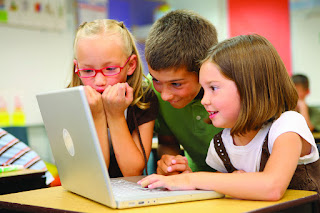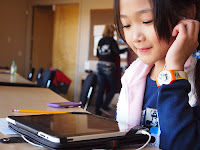LEARNING
OBJECTIVES:
Multimedia Can Be Used At
Anywhere And Anytime To Assist Learning For Education, From an educational
perspective the potential and popularity of AR indicates wide applicability in
the future. It is user friendly and supports interactions between person and
the computer device that bring people
into the new era from anywhere and at
anytime to assist learning, using wideranging and relevant material. For
example, AR can function with voice recognition, gesture recognition, paper
markerbased, markerless, Global Positioning System (GPS), 2D recognition and 3D
recognition. The interesting fact is that the Mobile Augmented Reality is
forecast to reach US$1.5 Billion by 2015. According to Juniper Research’s
report, the installed base of AR capable smart phones increased dramatically
from 8 million in 2009 to more than 100 million in 2010. On social networking
applications such as Twitter, AR was mentioned at least five times an hour in
2009.
AR will become a
successful application that most people exposed to it will consider fascinating
and it has been used to drive the viewer’s engagement. The book is one of the
most well know formats to deliver knowledge and information for learners of all
ages because of its simplicity and flexibility. Users of the MagicBook looked
on the book through an Augmented Reality Display or Handheld Display (HHD) to
find 3D virtual models appearing out of the pages. The concept of AR on a
physical book had been expanded to be an educational computer game, 3D
multimedia with real time interaction. The Interactive Alien Book was another
AR on the physical book which uses the same concept but adds on a function of
multi-languages of AR. AR adds value to the book, especially the children’s
book business since AR was nominated as the best interface to view the virtual
scene. In order to increase the learning
impact and draw attention to the blended learning environment, the main
objectives of this current research were purposively intellectual.
Five
Learning Objectives:
The Seed Shooting Game,
the AR 3D pop-up book, was mainly used to serve five learning objectives for
these young Thai children:
1) understand where to
put quotation marks,
2) demonstrate an
understanding of the story,
3) place the events in
chronological order correctly,
4) match pictures with
the vocabulary correctly, and
5) use simple
prepositions to describe the image.
This AR 3D pop-up book
integrated the knowledge with entertainment through storytelling techniques and
colourful cartoons. The storytelling technique was much enhanced, given its
potential after its testing of its capacity to win students’ attention. Almost
nine out of ten (88%) students indicated storytelling can positively influence
the learning environment . This might be because storytelling generally
develops ways of learning, knowing and talking about issues, which has the
potential to influence how students will approach their professional
practice. Thus, three main sources of
knowledge were drawn upon before developing the AR 3D pop-up book for academic
purposes: the basic knowledge of AR, the in depth knowhow of AR and related
educational theory and principles.
Therefore, the hypothesis of this particular part of the study is: if
the AR 3D pop-up book is an enhanced teaching strategy, then the average
achievement scores of children being taught through this method will increase.
Development
Process:
This paper aims to
describe only the development process which was comprised of three phases:
1) pre-production,
2) production and
3) post-production.
1. Pre-Production Phase
The pre-production stage comprised: the preparation and refining of the
contents of the story, the script and the illustrations for the cartoon
graphics for the production stage. The first draft was a 2D cartoon story,
which contained graphics and the text of The Seed Shooting Game Story. The
story was refined by an expert in children’s storytelling, both its graphics
(visual) and its script (text) until it was concise, clear, and suited for Thai
Grade Three students. Then, the pre-instruction part of the media production
comprised developing the introduction, the learning objectives, the vocabulary,
the quotation marks and the prepositions. This pre-instruction part was checked
by an English teacher with native proficiency and a degree in teaching English
as a foreign language for elementary levels. All tests were drafted based upon
the learning objectives. The first draft exercise was created as a crossword
game (10 words) and a word finder game (10 words). The first draft of the
achievement assessment included 30 items of three-option-multiple choice. All
tests were piloted with 44 students who studied from the package of The Seed
Shooting Game. From class observation, students were very excited with the
cartoon graphics and story, however, the crossword and search word activities
took too long to complete during class. To evaluate the difficulty level and
discriminating value of each item and the reliability level of the whole
achievement test, the results were computed. It was found that only 25 items of
the achievement test were deemed appropriate for evaluation purposes and thus
selected to use in the next stage.
2. Production Phase
Based on all the advice from the expert of storytelling and the native English
teacher, the researcher revised the script and the graphics. Obviously to
create the AR 3D popup book with multimedia features and to underpin the
meticulous nature of this research, there were many steps:
a) Sound effect and
voice recording The script of each page
was proofread and edited before its studio recording. All sound effects were
selected from a royalty-free sound-effect database. After recording, all
voices, melody and sound were uploaded to the server. This involved special
support from the AR creator.
b) Graphic and cartoon
creating Each graphic and cartoon
character was designed and converted to Portable Network Graphics (PNG) which
contained the necessary transparency background. In particular, the cartoon
characters included all details of face emotion and gesture to make sure that
they delivered the precise story nuances. There were approximately 200 images
used in this research.
They were all uploaded through the browser on the
Internet. c) Book Assembly Each page of the book follows the approved
script. Each graphic needed to be linked and synchronised with the text and
sound. d) Evaluation of the AR 3D
pop-up book The first draft of the AR 3D
pop-up book was evaluated by five educational technologists. The feedback
involved what needed to be changed such as the colour of the text and objects
within the graphics which needed to be clearer on the computer screen. These
were amended in the revision and other
important factors such as quality of sound and quality of graphic,
colour of graphic and flow of the story were considered appropriate for the learning
objectives. Every step was very carefully planned and implemented throughout
this curriculum materials project.
3. Post-Production
Phase The post-production phase was conducted with the class in three stages-
a) individual trials,
b) small group trial
and
c) real class trial –
each is outlined in the following sections.
a) Individual
trials The purpose of the individual
trials was to examine the differences of the interaction with the developed
media of three students who had different competency levels. They were
purposely selected in order to represent the general student body from
excellent to low competency levels. All three were fascinated with AR. After
the experiment, it was found that each was delighted and stimulated by the AR
3D pop-up book and multimedia functions. All three undertook the achievement
test and completed it. However, the exercise using the crossword and word
finder games were not too difficult for all levels of students but took too
long to complete. Thus, the exercise was changed to three-optionmultiple choice
and fill-in-blank – and this reduced any complexity that may have inhibited the
accuracy of the data.
It should be noted that the questionnaire was designed to
ensure that the “Hawthorne Effect” did not impact by adopting a low key
approach to the research when in contact with the students. The Hawthorne
Effect is when individual or group behaviour may be impacted upon when subjects
are knowingly placed under observation. This circumstance is commonly seen as
positive or beneficial, because it is argued that group members when aware they
are under observation produce behaviours or perform at a higher level than they
might otherwise have. The concept or term is derived from a study which
focussed on employee satisfaction at a General Electric manufacturing factory
in Hawthorne, Illinois, in 1924-1932 but the term was not coined and the effect
was not effectively noted until the 1950s. This may pose a limitation in the
research but it is considered minimal due to the simple honesty that children
exhibit.
b) Small group
trial The small group trial was aimed at
investigating the way that students participated with the blended study process
using the AR 3D pop-up book and learning package. Three groups of five students
were purposely selected at a) excellent, b) average and c) low level of
competency. After the trial, it was found that all 15 students were stimulated
by the blended learning process. All students understood the directions and the
contents of the achievement test and completed it on time. The blank
questionnaire exercise was also completed on time. All students were observed
to have enjoyed the practical task and actively participated in the learning
activities during class.
c) Real class
trial The real class trial was
conducted to simulate a real classroom situation in Bangkok, the capital city
of Thailand, a selected developing country. Basically, the elementary class
size in Bangkok is usually about 40+ students. This experiment had 37 students
attending the blended learning trial, 20 males and 17 females. To establish
what impact on development the AR 3D pop-up book had on student learning, the
first step in the classroom-based research involved a pre-test, testing their
knowledge of the material to be learned. The test is 25 items of
three-option-multiple choice which was developed at the pre-production stage.
The next research step involved students completing an exercise sheet which
measured their understanding of the material during the actual class. The
exercise sheet consists of 30 items, 26 items of fill-in-blank and four items
of threeoption-multiple choice. The sum of correct exercise scores equalled
97.84 per cent. After participating in blended learning environment using an AR
package of The Seed Shooting Game, the next research stage involved students
completing a post test which is the same as the pre-test. The sum of
achievement scores equalled 87.78 per cent. An added research finding
concerning the comparison of achievements between pre-test (34.16 %) and post
test (87.78 %) of students using the t-test found that the outcomes such as
depth of learning, comprehension and engagement gained from the study were
higher than when measured prior to the study.
Specifically, the results
obviously present that when students studied from the AR 3D pop-up book, their
achievements increased (Figure 6). This result confirmed accepting the
hypothesis. Additionally, this research finding comparing the achievements of
female students (89.4 %) and male students (87.4 %) using the t-test
independent found that there was no significant difference though female
students earned slightly higher.













No comments:
Post a Comment